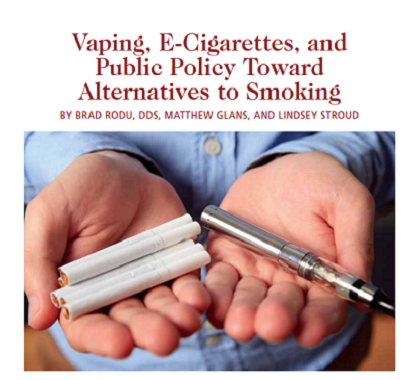For decades, lawmakers and regulators have used taxes, bans, and strong regulations in an attempt to reduce the negative health effects of smoking. Recently, some have sought to extend those policies to electronic cigarettes. A new booklet published by The Heartland Institute titled Vaping, E-Cigarettes, and Public Policy Toward Alternatives to Smoking urges policymakers to re-think that tax-and-regulate strategy.
Health professionals have long known that the smoke created by combustible cigarettes, rather than the nicotine, is what makes smoking harmful. Smokeless tobacco and e-cigarettes provide a much safer and healthier alternative delivery system for nicotine. Tobacco harm reduction is a proven strategy for helping smokers reduce their tobacco use or quit altogether.
Dr. Brad Rodu, lead author of Vaping, E-Cigarettes, and Public Policy Toward Alternatives to Smoking, has been at the forefront of tobacco harm reduction research and policy development for more than 20 years. He is a professor of medicine at the University of Louisville, where he is a member of the James Graham Brown Cancer Center and holds an endowed chair in tobacco harm reduction research.
Dr. Rodu and his coauthors – Matthew Glans and Lindsey Stroud of The Heartland Institute – encourage policymakers to be mindful of the extensive research that supports tobacco harm reduction and understand that “bans, excessive regulations, or high taxes on e-cigarettes could encourage smokers to stay with more-harmful traditional cigarettes.”
Download the free PDF of the booklet here.
This comprehensive booklet discusses many issues in the debate about electronic cigarettes and vaping, including:
■ Indoor and outdoor bans on vaping
■ Prohibiting e-cigarette purchases by minors
■ Regulating flavors
■ Myths and facts about e-cigarettes
■ The idea there is an epidemic of children being poisoned by e-cigarettes
■ E-cigarettes as a gateway to smoking
■ How e-cigarettes help smokers quit
■ History of failed anti-smoking campaigns
■ The case for tobacco harm reduction
■ ‘Quit or Die’ as the only strategy
To schedule an interview with one of the authors of this booklet – or if you would like additional information regarding tobacco harm reduction or vaping – contact Heartland Institute Director of Communications Jim Lakely at [email protected] or by cell at 312/731-9364.






